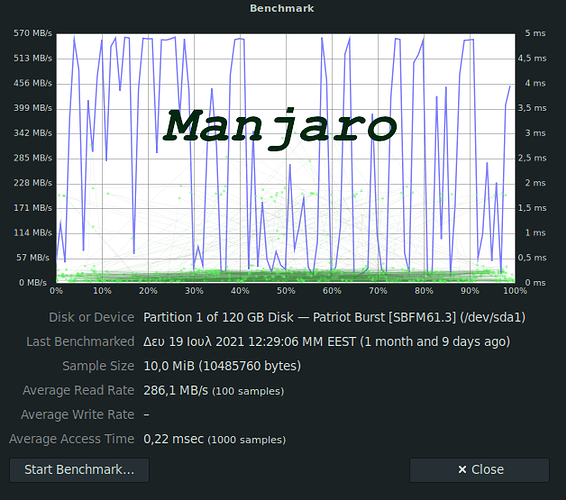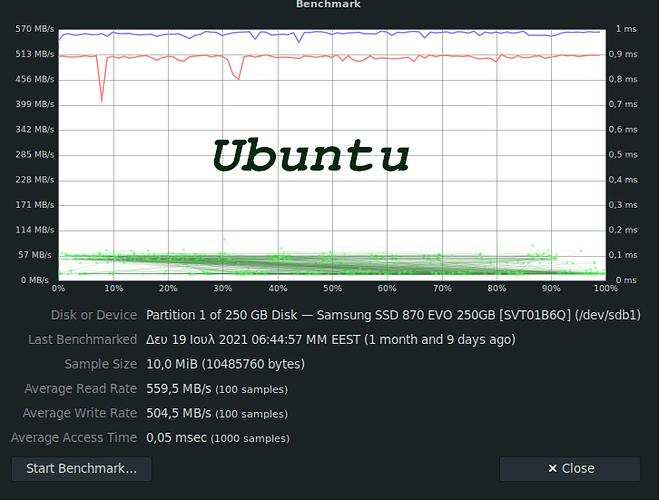I know my question is not important but I am curious that a disk with an average speed of 286 MB / s is way far faster to boot than one with an average speed of 559 MB / s.
Manjaro-mate vs Ubuntu-mate.
I know that it plays a significant role applications run at startup but i can not figure out how long it takes for ssd samsung to boot so believing it is a hdd!!
Thank you in advance
To debug the slow boot, we need the outputs of systemd-analyze blame and systemd-analyze critical chain.
However, I don’t know why the average read rate in Manjaro is almost half of that in Ubuntu.
[joe@joe-Manjaro ~]$ systemd-analyze blame
7.574s man-db.service
3.240s polkit.service
2.657s cups.service
2.049s udisks2.service
1.755s avahi-daemon.service
1.755s systemd-random-seed.service
1.753s NetworkManager.service
1.538s systemd-logind.service
1.182s dev-sda1.device
1.122s logrotate.service
976ms geoclue.service
948ms lightdm.service
797ms ModemManager.service
766ms systemd-journal-flush.service
682ms wpa_supplicant.service
675ms systemd-fsck@dev-disk-by\x2duuid-826362bc\x2de4dd\x2d4a91\x2da2f8\x2d840>
631ms add-autologin-group.service
580ms accounts-daemon.service
553ms tlp.service
503ms systemd-udevd.service
405ms lm_sensors.service
232ms systemd-tmpfiles-setup-dev.service
216ms alsa-restore.service
216ms systemd-modules-load.service
211ms linux-module-cleanup.service
158ms systemd-journald.service
155ms modprobe@drm.service
154ms systemd-tmpfiles-setup.service
147ms lvm2-monitor.service
146ms colord.service
128ms modprobe@fuse.service
125ms systemd-udev-trigger.service
124ms user@1000.service
124ms systemd-binfmt.service
116ms dev-hugepages.mount
116ms dev-mqueue.mount
115ms sys-kernel-debug.mount
114ms sys-kernel-tracing.mount
114ms kmod-static-nodes.service
112ms modprobe@configfs.service
76ms systemd-remount-fs.service
55ms upower.service
47ms home.mount
46ms ufw.service
37ms systemd-tmpfiles-clean.service
22ms systemd-sysctl.service
11ms systemd-update-utmp.service
6ms systemd-user-sessions.service
6ms user-runtime-dir@1000.service
5ms rtkit-daemon.service
4ms tmp.mount
1ms proc-sys-fs-binfmt_misc.mount
1ms sys-kernel-config.mount
1ms sys-fs-fuse-connections.mount
[joe@joe-Manjaro ~]$ systemd-analyze critical-chain
The time when unit became active or started is printed after the "@" character.
The time the unit took to start is printed after the "+" character.
graphical.target @8.991s
└─multi-user.target @8.991s
└─ModemManager.service @8.193s +797ms
└─polkit.service @4.951s +3.240s
└─basic.target @4.811s
└─sockets.target @4.811s
└─dbus.socket @4.811s
└─sysinit.target @4.797s
└─systemd-update-utmp.service @4.785s +11ms
└─systemd-tmpfiles-setup.service @4.630s +154ms
└─local-fs.target @4.629s
└─home.mount @4.582s +47ms
└─systemd-fsck@dev-disk-by\x2duuid-826362bc\x2de4dd\x2d4a>
└─dev-disk-by\x2duuid-826362bc\x2de4dd\x2d4a91\x2da2f8\>
Manjaro.Wait to boot from ubuntu to send the other!
Ubuntu resolts
joe@joe-desktop:~$ systemd-analyze blame
7.706s fstrim.service
5.347s NetworkManager-wait-online.service
1.738s udisks2.service
814ms tor@default.service
758ms man-db.service
691ms dev-sdb1.device
631ms logrotate.service
359ms networkd-dispatcher.service
337ms snapd.service
309ms cups.service
277ms accounts-daemon.service
199ms polkit.service
195ms apparmor.service
175ms lightdm.service
173ms avahi-daemon.service
169ms NetworkManager.service
169ms systemd-modules-load.service
167ms plymouth-quit-wait.service
160ms ModemManager.service
142ms systemd-resolved.service
134ms systemd-logind.service
130ms thermald.service
126ms wpa_supplicant.service
126ms tlp.service
122ms apport.service
114ms systemd-timesyncd.service
112ms e2scrub_reap.service
110ms user@1000.service
108ms upower.service
102ms keyboard-setup.service
98ms systemd-udev-trigger.service
92ms alsa-restore.service
91ms lm-sensors.service
90ms systemd-journald.service
79ms rsyslog.service
77ms grub-common.service
77ms gpu-manager.service
76ms systemd-journal-flush.service
71ms systemd-udevd.service
62ms colord.service
55ms pppd-dns.service
42ms tor.service
38ms snapd.seeded.service
37ms networking.service
36ms systemd-sysusers.service
33ms systemd-random-seed.service
30ms systemd-tmpfiles-setup.service
29ms systemd-fsck@dev-disk-by\x2duuid-c8bfc0f9\x2d9668\x2d48d9\x2d83f7\x2d680>
24ms kerneloops.service
23ms openvpn.service
21ms systemd-remount-fs.service
21ms systemd-user-sessions.service
20ms hddtemp.service
18ms plymouth-start.service
18ms systemd-sysctl.service
18ms dev-hugepages.mount
18ms dev-mqueue.mount
17ms sys-kernel-debug.mount
16ms sys-kernel-tracing.mount
16ms snapd.apparmor.service
15ms sys-kernel-config.mount
14ms grub-initrd-fallback.service
14ms user-runtime-dir@1000.service
13ms plymouth-read-write.service
12ms systemd-update-utmp-runlevel.service
12ms home.mount
12ms kmod-static-nodes.service
12ms systemd-tmpfiles-setup-dev.service
11ms modprobe@configfs.service
11ms modprobe@drm.service
11ms console-setup.service
11ms modprobe@fuse.service
10ms systemd-update-utmp.service
10ms sys-fs-fuse-connections.mount
8ms setvtrgb.service
8ms ufw.service
4ms ifupdown-pre.service
3ms rtkit-daemon.service
1ms snapd.socket
joe@joe-desktop:~$ systemd-analyze critical-chain
The time when unit became active or started is printed after the "@" character.
The time the unit took to start is printed after the "+" character.
graphical.target @1min 35.841s
└─multi-user.target @1min 35.841s
└─kerneloops.service @1min 35.816s +24ms
└─network-online.target @1min 35.810s
└─NetworkManager-wait-online.service @1min 30.462s +5.347s
└─NetworkManager.service @1min 30.289s +169ms
└─dbus.service @1min 30.287s
└─dbus.socket @1min 30.280s
└─basic.target @1min 30.279s
└─sockets.target @1min 30.279s
└─cups.socket @1min 30.612s
└─sysinit.target @1min 30.264s
└─snapd.apparmor.service @1.137s +16ms
└─apparmor.service @940ms +195ms
└─local-fs.target @937ms
└─run-user-1000-gvfs.mount @1min 36.845s
└─run-user-1000.mount @1min 36.649s
└─local-fs-pre.target @284ms
└─keyboard-setup.service @182ms +102ms
└─systemd-journald.socket @175ms
└─system.slice @105ms
└─-.slice @105ms
I see fstrim cups and others slowing down.I left ubuntu just in case somthing go too wrong! Must fix alitle things.
I’m guilty ! 
Just for your information, there is currently a hot tech news item regarding a malpractice among several SSD makers.
Long story short, they introduce a new and fast model, and then silently replace the chipset a little farther into production without changing the information and type number of the drive. These new drives are then crippled from a certain used capacity onward, when performance then suddenly radically drops for the remaining storage area of the drive.
Among the guilty ones are Samsung and Western Digital.
For what it’s worth, I’m using Ubuntu MATE and Manjaro KDE on the same NVMe drive. Manjaro (Btrfs) starts much faster than Ubuntu (ext4).
Anybody smell collusion? Wouldn’t be the first time.
Yes… 
The collusion includes


